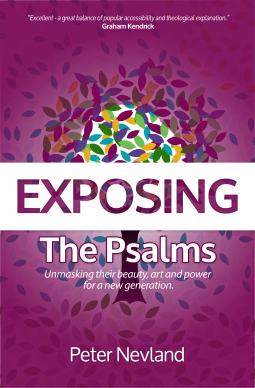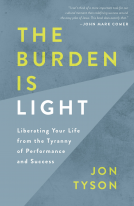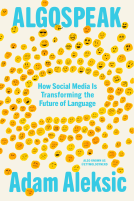
Exposing The Psalms
Unmasking their beauty, art and power for a new generation
by Peter Nevland
This title was previously available on NetGalley and is now archived.
Send NetGalley books directly to your Kindle or Kindle app
1
To read on a Kindle or Kindle app, please add kindle@netgalley.com as an approved email address to receive files in your Amazon account. Click here for step-by-step instructions.
2
Also find your Kindle email address within your Amazon account, and enter it here.
Pub Date Mar 18 2014 | Archive Date May 26 2015
Description
'You have to experience the Psalms to understand them. They're art, not
essays. You understand art when it surrounds and barrages your senses,
like it would at a gallery, a museum, or surrounded by paint and
canvasses in an artist's studio. This book is a gallery where you can
play with the art.' - Peter Nevland
The introduction of this book encourages readers to 'mind the gap'
between the distant ancient culture of the psalmists and our current
world. The author outlines his method of interpreting the psalms (a
nine-step interpretive process) before proceeding to explore 30 of the
150 psalms.
The book has an unusual design - more like a montage of comments than a
commentary in the traditional sense. It doesn't examine the selected
psalms in their canonical order, but starts with Psalm 45, goes to 85,
then to 23, then to 100, 24, and so on. Each commentary on the psalm is
followed by a poem written by the author - a kind of lyrical exploration
of some of the ideas in the psalm, which is, of course, itself a
lyrical medium.
'Excellent - a great balance of popular accessibility and theological explanation.' - Graham Kendrick
Advance Praise
No Advance Praise Available
No Advance Praise Available
Marketing Plan
No Marketing Info Available
No Marketing Info Available
Available Editions
| EDITION | Paperback |
| ISBN | 9781860249037 |
| PRICE | £7.99 (GBP) |
Average rating from 8 members
Featured Reviews
 Jerry H, Educator
Jerry H, Educator
Title: Exposing the Psalms
Author: Peter Nevland
Publisher: Authentic Media
Year: March 2014
Pages: 240 (e-book)
Additional Information: Spoken Groove
Buy at Amazon: Exposing the Psalms
Tree of Psalms project
[Disclaimer: Some high ranking government official had a brainchild one day and said that if I didn't inform my readers that I received a free copy of the book in exchange for my unbiased review then you, the reader, might assume the review was biased. Either way, I received a free e-copy of this book in exchange for my mostly unbiased review.]
I am glad Nevland included an index in the back of his book Exposing the Psalms. For me, as a theologian first and a reader second, it is important to know what sort of literature influenced an author who has had the audacity to write about Scripture. I am fairly well read when it comes to commentaries and theology and I have to say that the sources were a bit lacking. There's nothing wrong with reading Matthew Henry's (1700's) commentaries or with reading Jameson, Fausett, and Brown (1800s) or with reading John Gill (1700s), but the fact remains that there are literally hundreds of commentaries that would provide and additional 300 years worth of insight into the Psalms. I'm sure Mr Nevland has his own reasons for using these particular commentaries, maybe not. Still I find it bizarre in a curious sort of way. Again, it's not that it's wrong, it's just strange.
The book itself is an interesting read. One of the more important aspects of the book is that Nevland does not come at the Psalms with an overtly scholarly point of view. He might be a scholar, as is evident (occasionally) by the depth of his writing, and there is a strong theological element to the books too, but maybe he's just good at research and processing. He does outline his methods at the beginning, which is helpful too, but maybe he prefers simply to read and experience the Psalms (such as he did with Psalm 95 where he wrote that he 'must have read it more than twenty times, before it changed me enough to connect to its story', 100.)
Either way, there were times when reading the book that I was simply blown away by the depth of the insight he offered on a verse or a Psalm (e.g., his thoughts on Psalms 148 & 133 were brilliant). Then there were times when I was somewhat shocked by what appeared to be a rather naive approach to a Psalm (e.g., his thoughts on Psalm 23 & 24 were incredibly similar, theologically strange, and in my experience difficult to accept as meaningful: "So the 'paths of righteousness' in Psalm 23 instantly draw a picture of God leading you on a road where you can do no wrong.He'll surround you with so much goodness, you can't make a mistake. Instead of goodness coming from the inside out, it attacks you until it penetrates your soul. Every possible decision is right", 34. Frankly, I have no idea what those sentences mean. See also, pages 39 & 205 where there are hints of this 'prosperity' notion. )
At the end of each section of writing about a specific Psalm (Nevland covers 30 of them in the book, and in random order. I didn't care for the randomness of the order, but again I suppose he had his purposes) Nevland gives the reader 3 questions to mull over and answer. I thought this was an especially nice idea. It helps draw the reader back into the Psalm and also encourages deeper or at least more focused thought about the Psalm. He also included at the end of each section a song or a poem that is somehow closely connected with the Psalm he has just exposed us to. I will say this much, I admire Nevland as an artist, but I didn't have much use for the songs/poems. Frankly, I got to the point where I just stopped reading them. In my opinion, the book was neither better nor worse because of their inclusion. Some readers will enjoy them and read them, others will not.
A small point of contention for me was the imbalance of the book. Some chapters were really long and heavy. Other chapters were very short and ended somewhat abruptly. It may be a personal thing, but I would have preferred a bit more balance to the chapters. (I get that some Psalms are longer than others and require more pages, but I think there are ways to solve that particular problem.) Balance in chapters helps a reader establish a rhythm in their reading and it was difficult to establish such a rhythm with the disproportionate chapters.
The truth is, this is not the type of book one should sit down and read straight through and then review on a blog. This is a slow book. By that I mean, I think it needs to be read slowly, one needs to take their time, one needs to dance a little with the Psalms Nevland is exposing (and by and large I think he did a fine job keeping the Psalms in their historical context) in order to fully appreciate what he is doing--which is where I think Nevland's brilliance shines forth: these are songs, psalms, poems read, performed, or sung at the king's court or in the King's court. These Psalms are neither monotone, nor monolithic. These songs were written, often, in community. They were most certainly performed in community. They are towering, staggering collections of voices, read throughout the generations of those who seek the Face of God from during the high points of festivals to the lowest depths of dereliction. These are the voices of honesty and praise and worship and lament and fear and abandonment and adoration and faith. These are the voices of God's people through the ages attempting to understand God's absence and attempting to stand up in his presence.
If I had to narrow my thoughts down and say something absurd like 'this is the one thing Nevland did exceptionally well in his book' it would be at this point. I think Nevland did a remarkable work helping remind his readers of the historical context, the liturgical voice, the desperate prayers, the communal and personal nature of the Psalms. I enjoyed that he got me thinking about these Psalms not as mere words scratched into a scroll or parchment--detached from all context or historical upheaval--but as the words of living, breathing people who were being chased by rebels, threatened by wild animals, or suffocating and gasping for their last breath. I like that he got me listening to the words as if a full band were playing in the background and dancers were leaping and twirling with every word. He got me thinking about people trembling in the presence of enemies and finding peace in the presence of God. In a word, he had a way of bringing these Psalms out of their scholarly garb and into my work & play clothes. That, in my opinion, is the best part of the book.
I do have one complaint about the book: Jesus just seems kind of thin in the book. There are times when Jesus is Jesus, but there are other times when he is 'some other famous guy' (see 127). This bothered me. It's probably not that Nevland purposely avoided Jesus and I'm certainly not saying that he has no interest in Jesus. I am saying that even Jesus pointed out that the Psalms were, by and large, written about him (see Luke 24:44). Does this mean every Psalm is about Jesus? Maybe. Maybe not. My point is that we may well find that the Psalms speak to us or speak for us (even Jesus prayed the Psalms at his crucifixion, see Luke 23:46, Matthew 27:46), we may find that they offer us great consolation or great consternation, but at the end of the day the Psalms point to something, someone, beyond themselves. The Psalms are not Psalms merely for their own sake.
Nevland doesn't necessarily avoid Jesus, but neither do I think he goes out of his way to make him as fully present, or as evident in the Psalms, as he could have. It's important that the Psalms live, but even the authors of the Psalms would probably tell us they were not writing merely to bring out the emotional best in the readers.
I give this book 4/5 stars.














